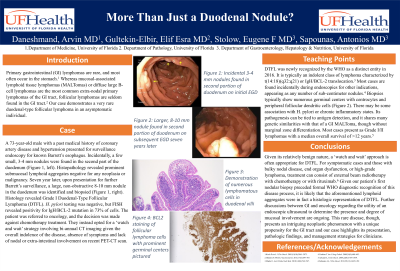Tuesday Poster Session
Category: Small Intestine
P4164 - More Than Just a Duodenal Nodule?
Tuesday, October 24, 2023
10:30 AM - 4:00 PM PT
Location: Exhibit Hall

Has Audio

Arvin Daneshmand, MD
University of Florida
Gainesville, FL
Presenting Author(s)
Arvin Daneshmand, MD, Esra Gultekin-Elbir, MD, Eugene Stolow, MD, Antonios Sapounas, MD
University of Florida, Gainesville, FL
Introduction: Primary gastrointestinal (GI) lymphomas are rare, and most often occur in the stomach.1 Whereas mucosal-associated lymphoid tissue lymphomas or diffuse large B-cell lymphomas are the most common extra-nodal primary lymphomas of the GI tract, follicular lymphomas are seldom found in the GI tract.2 Our case demonstrates a very rare duodenal-type follicular lymphoma in an asymptomatic individual.
Case Description/Methods: A 73-year-old male with a past medical history of coronary artery disease and hypertension presented for surveillance endoscopy for known Barrett’s Esophagus. Incidentally, a few small nodules were found in the second part of the duodenum, with histopathology revealing prominent submucosal lymphoid aggregates negative for any neoplasia or malignancy. Seven year later upon presentation for further surveillance of Barrett’s, a large nodule in the duodenum was identified and biopsied. Histology revealed Grade I Duodenal-Type Follicular Lymphoma. H. pylori testing was negative. FISH revealed positivity for IgH/BCL-2 mutation in 73% of cells. The patient was referred to oncology, and the decision was made not to treat with chemotherapy and instead opt for a ‘watch and wait’ strategy given the overall indolence of the disease.
Discussion: Duodenal Type Follicular Lymphoma was newly recognized by the WHO as a distinct entity in 2016. It is typically an indolent class of lymphoma characterized by t(14:18)(q32:q21) or IgH/BCL-2 translocation.3 Most cases are found incidentally during endoscopies for other indications, appearing as any number of sub-centimeter nodules.4 Biopsies typically show numerous germinal centers with centrocytes and peripheral follicular dendritic cells. There may be some association with H. pylori or chronic inflammatory states, as its pathogenesis can be tied to antigen detection and it shares many genetic similarities with that of a GI MALToma (without marginal zone differentiation). Most cases present as Grade I/II lymphomas with a median overall survival of >12 years.5
Given its relatively benign nature, a ‘watch and wait’ approach is often appropriate for duodenal type follicular lymphoma. For symptomatic cases and those with bulky nodal disease, end organ dysfunction, or high-grade lymphoma, treatment can consist of EBRT with chemotherapy or with Rituximab.6 This rare disease presents an intriguing neoplastic phenomenon with a unique propensity for the GI tract and our case highlights its presentation, pathology, and management strategies for clinicians.

Disclosures:
Arvin Daneshmand, MD, Esra Gultekin-Elbir, MD, Eugene Stolow, MD, Antonios Sapounas, MD. P4164 - More Than Just a Duodenal Nodule?, ACG 2023 Annual Scientific Meeting Abstracts. Vancouver, BC, Canada: American College of Gastroenterology.
University of Florida, Gainesville, FL
Introduction: Primary gastrointestinal (GI) lymphomas are rare, and most often occur in the stomach.1 Whereas mucosal-associated lymphoid tissue lymphomas or diffuse large B-cell lymphomas are the most common extra-nodal primary lymphomas of the GI tract, follicular lymphomas are seldom found in the GI tract.2 Our case demonstrates a very rare duodenal-type follicular lymphoma in an asymptomatic individual.
Case Description/Methods: A 73-year-old male with a past medical history of coronary artery disease and hypertension presented for surveillance endoscopy for known Barrett’s Esophagus. Incidentally, a few small nodules were found in the second part of the duodenum, with histopathology revealing prominent submucosal lymphoid aggregates negative for any neoplasia or malignancy. Seven year later upon presentation for further surveillance of Barrett’s, a large nodule in the duodenum was identified and biopsied. Histology revealed Grade I Duodenal-Type Follicular Lymphoma. H. pylori testing was negative. FISH revealed positivity for IgH/BCL-2 mutation in 73% of cells. The patient was referred to oncology, and the decision was made not to treat with chemotherapy and instead opt for a ‘watch and wait’ strategy given the overall indolence of the disease.
Discussion: Duodenal Type Follicular Lymphoma was newly recognized by the WHO as a distinct entity in 2016. It is typically an indolent class of lymphoma characterized by t(14:18)(q32:q21) or IgH/BCL-2 translocation.3 Most cases are found incidentally during endoscopies for other indications, appearing as any number of sub-centimeter nodules.4 Biopsies typically show numerous germinal centers with centrocytes and peripheral follicular dendritic cells. There may be some association with H. pylori or chronic inflammatory states, as its pathogenesis can be tied to antigen detection and it shares many genetic similarities with that of a GI MALToma (without marginal zone differentiation). Most cases present as Grade I/II lymphomas with a median overall survival of >12 years.5
Given its relatively benign nature, a ‘watch and wait’ approach is often appropriate for duodenal type follicular lymphoma. For symptomatic cases and those with bulky nodal disease, end organ dysfunction, or high-grade lymphoma, treatment can consist of EBRT with chemotherapy or with Rituximab.6 This rare disease presents an intriguing neoplastic phenomenon with a unique propensity for the GI tract and our case highlights its presentation, pathology, and management strategies for clinicians.

Figure: Endoscopy: Left image with initial duodenal nodules; Right image with larger solitary nodule found on later endoscopy
Pathology: Left image of lymphomatous aggregates in duodenal villi; Right image of BCL2 staining with prominent germinal centers
Pathology: Left image of lymphomatous aggregates in duodenal villi; Right image of BCL2 staining with prominent germinal centers
Disclosures:
Arvin Daneshmand indicated no relevant financial relationships.
Esra Gultekin-Elbir indicated no relevant financial relationships.
Eugene Stolow indicated no relevant financial relationships.
Antonios Sapounas indicated no relevant financial relationships.
Arvin Daneshmand, MD, Esra Gultekin-Elbir, MD, Eugene Stolow, MD, Antonios Sapounas, MD. P4164 - More Than Just a Duodenal Nodule?, ACG 2023 Annual Scientific Meeting Abstracts. Vancouver, BC, Canada: American College of Gastroenterology.
